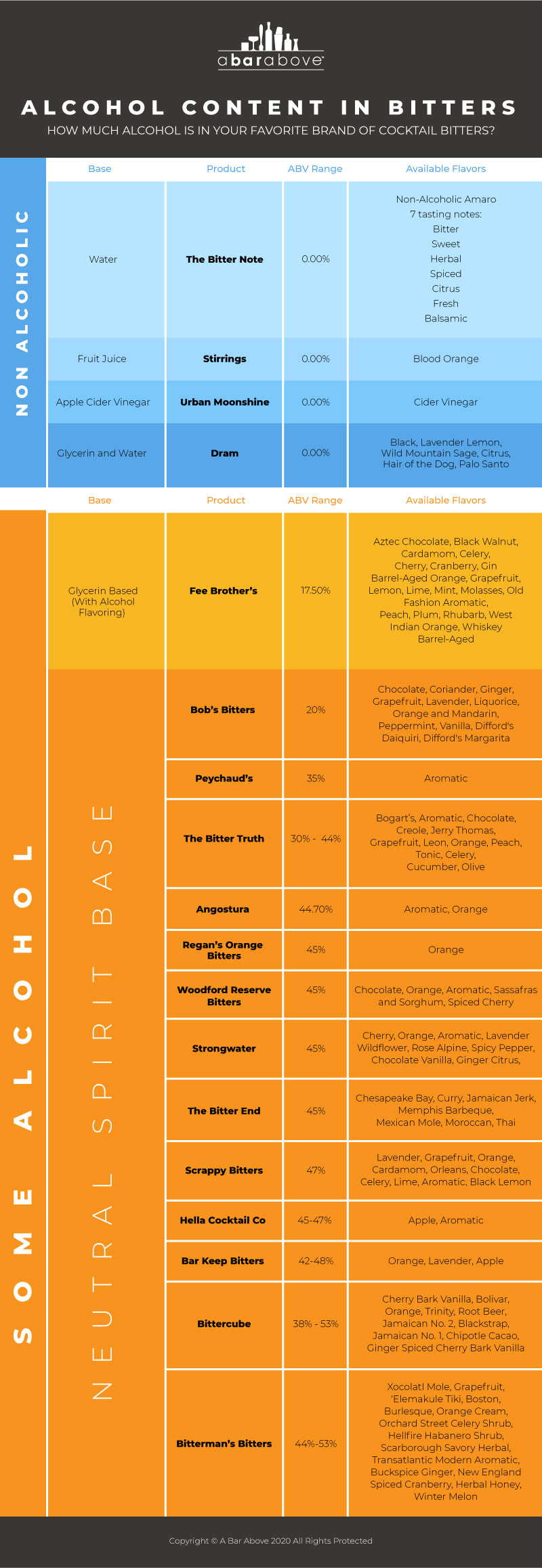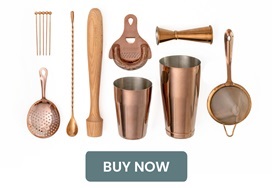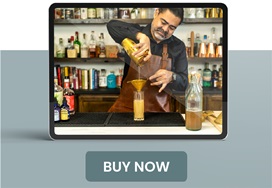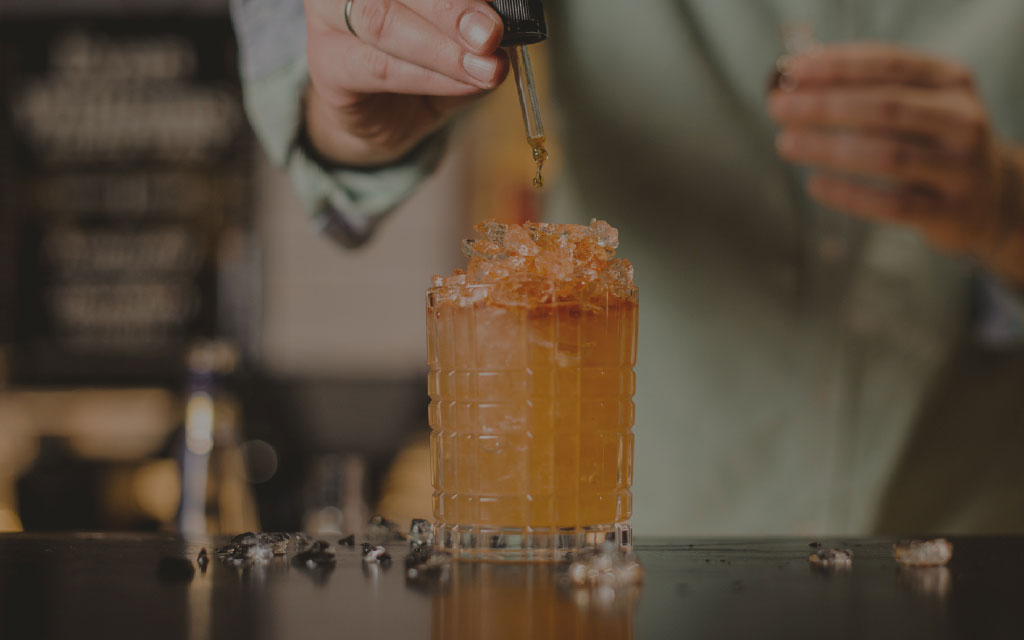
A Guide To Non-Alcoholic Bitters
If you’re a mocktail connoisseur or occasionally fancy a non-alcoholic cocktail, then you may have had trouble with one small, yet important ingredient: bitters.
Traditionally, bitters are made from infusing aromatics, like spices, seeds, roots and fruits, with a neutral spirit to pack a punch of flavor in just a few drops. Bitters by the bottle are highly alcohol dense, but since we only need a couple dashes per recipe, they technically only add a little bit of alcohol to your cocktail.
If you want to take your non-alcoholic cocktail to the next level, you’re probably going to want to include bitters. But how do you incorporate bitters without adding alcohol? Good question — and one I’m hoping to shed some light on today.
I researched high and low to give you the ultimate guide to non-alcoholic bitters. Now, you won’t have to miss out on that delicious aromatic touch that will make your mocktails taste oh so delicious! Read on to learn more, or skip to the end of this article for a handy infographic overview of the bitters available and their ABV’s (alcohol by volume).
What are Bitters?
The history of bitters is long and winding, with some arguing that its origin is over a thousand years old!
In this article, we’re specifically talking about cocktail bitters. Way back in the day (like hundreds or thousands of years), botanists would combine roots, fruits, botanicals and seeds, and distill it in alcohol in an effort to cure medical ailments. Eventually, it grew from something you’d sip on as medicine to providing exceptional flavor in your favorite cocktail.
Why It’s So Hard to Find Non-Alcoholic Bitters
Most cocktail bitters, like Scrappy Bitters and Angostura, are made from an infusion of aromatics that are distilled in a neutral spirit which is very high ABV. The high alcohol content extracts and preserves the flavors exceptionally well, which makes it genuinely difficult to find an alternative.
So, if bitters are typically so high in alcohol, then why don’t you have to show ID to buy it? Good question.
They are actually defined as a non-potable, “non-beverage” product due to their high concentration. This can best be compared to vanilla extract, which is also often very high in alcohol content, but is also used in super low amounts. That’s why we buy vanilla extract in the grocery aisle as opposed to the spirit section.
Since we only use a few dashes of bitters in our cocktail recipe, most people still consider your “mocktail” to be non-alcoholic even if it contains a dash or two of high ABV bitters. Similarly to vanilla extract, this is also why I don’t worry about adding a teaspoon of vanilla extract to my chocolate chip cookies. Even though the entire bottle of bitters is high in alcohol content, the small amount we need for a cocktail recipe adds less than or around one percent alcohol.
But, what if you want 100 percent, alcohol-free bitters? We’re talking no alcohol whatsoever; not even a drop. That’s where things get a little more challenging. And that’s where this article can help!
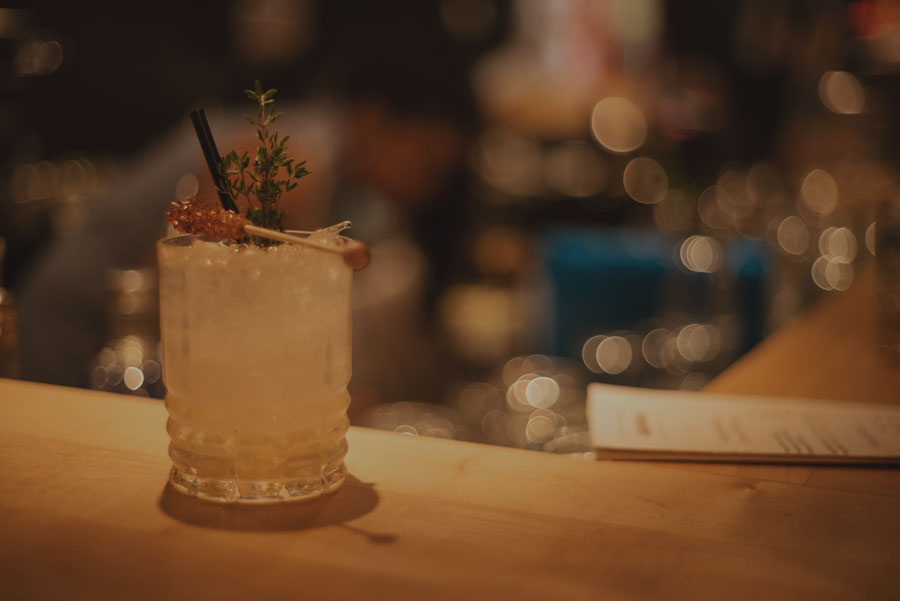
A Guide to Non-Alcoholic Bitters
After searching the web and sending a few emails, I’ve found some 100 percent non-alcoholic bitters that are guaranteed to spice up your craft mocktails!
Dram
While on the hunt for non-alcoholic bitters, I reached out to our Craft Bartender Community members for some help. They recommended Dram (the members in our Craft Bartender Community are quite the cocktail nerds, so I definitely trust their recommendation!).
Dram carries herbal non-alcoholic bitters in a variety of flavors, like citrus, lavender lemon and sage. They also carry a line of CBD products, but I confirmed none of their bitters contain CBD.
Curious about how they taste? Here’s what Camper English said in response to my post:
“I have tried the Black Bitters and Hair of the Dog ones and they work well. The Black Bitters I believe are supposed to be the most similar to Angostura.”
So, not only are Dram bitters 100 percent alcohol-free, but it’s been tried, tested and recommended! As an idea, try experimenting with Dram by making a virgin Manhattan with their Hair of the Dog bitters. Be sure to report back to the group with the results!
Stirrings
I haven’t personally tried Stirrings blood orange non-alcoholic bitters, but it sounds delicious. They describe their blood orange bitters as “blood orange juice cocktail mix from concentrate,” but don’t be fooled by its real fruit juice base. Stirrings recommends using it as a replacement for bitters in any recipe.
While Stirrings’ Blood Orange Bitters still pack powerful flavor, it’s sweeter than other bitters so keep that in mind when creating your mocktails. I suspect it’d be great in our No Ragrats non-alcoholic cocktail.
Urban Moonshine
Urban Moonshine is an apothecary company that makes bitters for medicinal purposes. While most of their bitters contain some alcohol, they created a non-alcoholic bitters with an apple cider vinegar base. I’m talking major earthy and sour tones. Depending on which mocktail you’re making, a little apple cider vinegar can add the right amount of flavor!
Our non-alcoholic Garden Party mocktail calls for a cucumber and lemon shrub, which requires vinegar to make. Try that recipe with 1/2oz less of the shrub and a dash or two of the Urban Moonshine’s Cider Vinegar Bitters.
The Bitter Note
The Bitter Note is a non-alcoholic bitters replacement that’s created from a blend of 40 botanicals. Say hello to a big ol’ bottle of non-alcoholic italian bitters packed with seven aromatic notes:
- Bitter – wormwood, gentian, cinchona
- Spicy – angelica root, cinnamon, juniper
- Fresh – mint, star anise
- Herbal – artichoke, aloe, chamomile
- Sweet – chamomile, sweet orange
- Balsamic – liquorice, angostura
- Citrus – bitter orange
I noticed there’s two non-alcoholic versions of the Bitter Note. One of them has zero percent alcohol, while the other has less than 0.5 percent alcohol. Unfortunately, the zero percent version isn’t sold in the US, but you can buy the less than 0.5 percent bottle online.
If you purchase The Bitter Note, be sure to try it in our non-alcoholic Nogroni recipe!
All the Bitter
We recently tried All the Bitter bitters and are excited to have found another alcohol-free option! They offer three different flavors, all of which are excellent. Unanimously, the whole team here at A Bar Above loved the New Orleans, a balanced, cherry-forward bitters that would pop in a variety of drinks.
Their orange bitters is reminiscent of any classic alcoholic bitters and perfect for an Old Fashioned mocktail. The aromatic is really strong; we tasted it on its own, and it packed a punch! In a non-alcoholic cocktail or even in soda water, it would bring a fun, woody bite of flavor.
Arkay
Arkay also produces a true non-alcoholic aromatic bitters. A great alternative to a traditional Angostura, this company boasts complex flavors like rhubarb, chamomile, licorice, and the signature spicy punch of bitters that will make you forget this version is actually alcohol-free.
The perfect addition to your non-alcoholic cocktails, try it with your spirit-free Old Fashioned or even add a few dashes to soda water for a little kick.
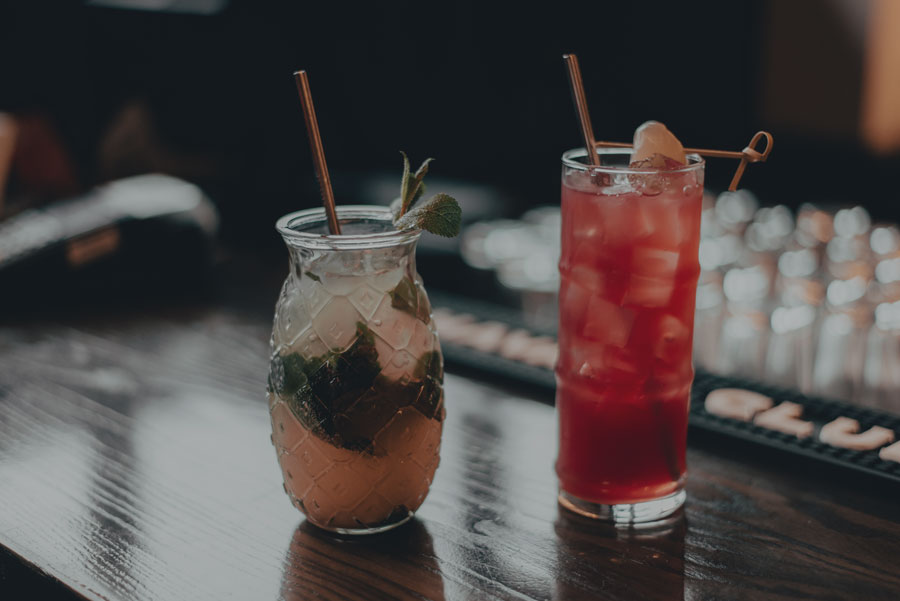
Non-Alcoholic Alternatives to Bitters
I love crafting a cocktail with creativity. So, if you like to think outside of the box, then why not try one of these non-alcoholic bitters alternatives?
- Crodino (Affiliate link) is a fantastic option that can be used as a substitute to bitters. It’s technically a non-alcoholic aperitif, but can be used swimmingly with a little creativity!
- Casamara Club makes a line of bitter non-alcoholic sodas. While they are a very different format than highly concentrated cocktail bitters, they can be added to non-alcoholic drinks to add a bitter and herbal element that would be missing otherwise.
The key with both of these is to be careful with your water content — they both introduce A LOT more water than traditional bitters, so you’ll need to account for that in your recipe to avoid watering down your drink and diluting the flavor.
Low ABV Bitters
Technically, all bitters are low in alcohol content— even if your favorite bottle of bitters boasts 50 percent ABV. As previously mentioned, bitters are made with a neutral grain spirit base and are highly concentrated, but we only use a few dashes, which adds less than one percent of alcohol to our cocktail.
So, since bitters only adds a teeny tiny amount of alcohol to your drink, they’re technically all low in alcohol (in the practical sense).
But, not all bitters share the same ABV percentage. Some bitters, usually made with a glycerin-based, (while not non-alcoholic) sport a lower ABV than bitters made with a spirit base.
Glycerin-Based Bitters
As just mentioned, some cocktail bitters are glycerin-based, like Fee Brother’s and Peychaud, but derive their alcohol content from flavoring. To extract the most potent botanical flavors, alcohol is used as the medium to extract flavors from fruits, nuts, vegetables and roots.
So, even though the base is glycerin, which is a colorless plant-based liquid, the alcohol content comes from the flavoring extraction process. So, then why do these companies use glycerin?
Glycerin is a texturizing agent that traps oils and prevents louching, which is when alcohol and water mix to create a cloudy liquid. So, some cocktail bitters companies use glycerin to better preserve the oils, flavoring, and the combination of alcohol and water.
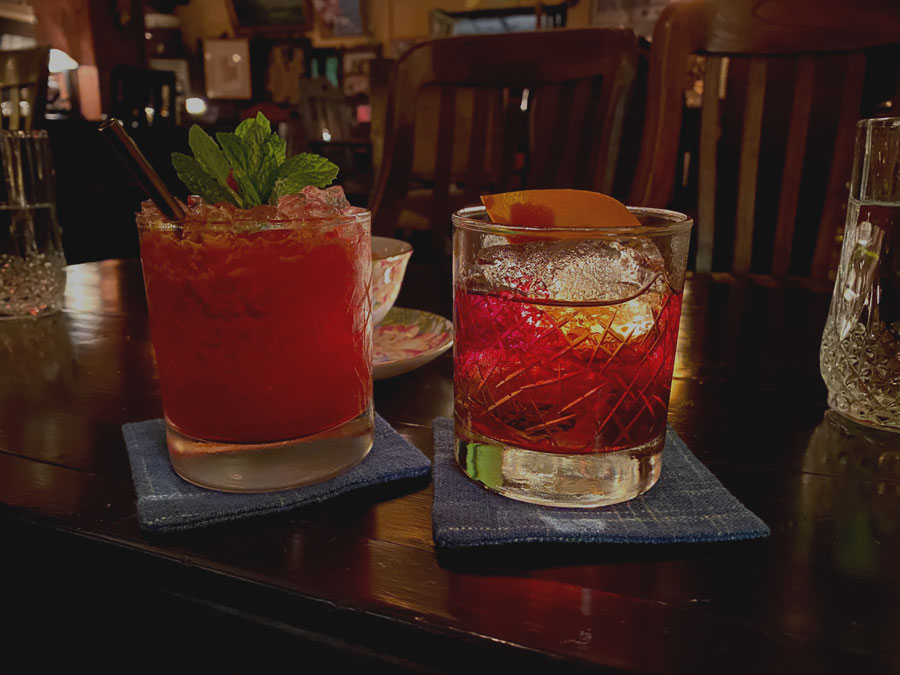
A Teeny Tiny Amount of Alcohol Per Dash
As I mentioned earlier, while all bitters (unless specifically noted as non-alcoholic) contain a high ABV, you’ll only use a dash or two in your cocktail. One dash is only 1/32 of an ounce or 0.92 ml, so even several dashes of a standard “spirit based” cocktail bitters would only add a miniscule amount of alcohol.
So if you’re ok with a tiny little bit of alcohol in your drink, then feel free to continue to use your favorite bitters.
Our Favorite Bitters
While we’re here, I asked Chris for his favorite cocktail bitters. If you’re ok with adding a couple of drops of alcoholic bitters to your mocktail, then this is a great place to start!
The Truth About Non-Alcoholic Bitters
Truthfully, finding these non-alcoholic bitters were pretty hard to come by! After doing some thorough research, I’ve found a few options to play around with and even a couple bitters alternatives. If you use one of our suggested non-alcoholic bitters, please join our Craft Cocktail Club or Craft Bartender Community and share your mocktail creation. I’d love to see what you create!

JULEP STRAINER – COPPER
Whether you’re making a Martini, Manhattan or Negroni, this trusty julep strainer has you covered. Fits perfectly in your mixing glass, feels comfy in your hand, and looks gorgeous in copper – what’s more to love?
